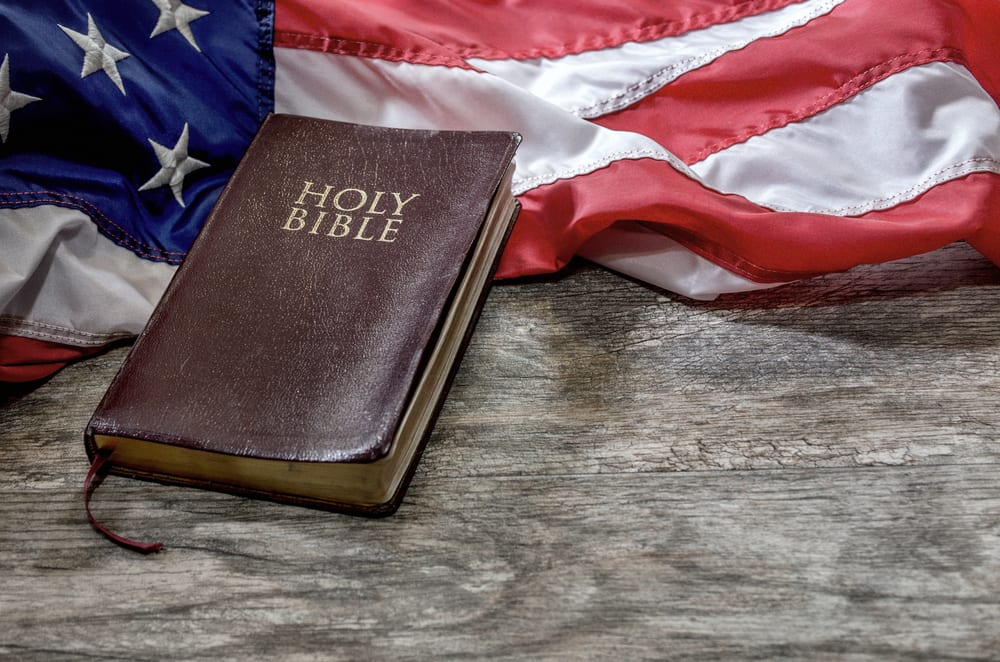When the Treaty of Tripoli was signed in 1796, President John Adams made clear that “the Government of the United States of America is not, in any sense, founded on the Christian religion.” But it’s just a minor treaty, right? Well, the Constitution effectively says the same thing. As the saying goes, the word “religion” appears twice in the document, both times preceded by the word “no.” We don’t have religious tests for public office and the government can’t endorse religion (much less a particular one).
All of this is apparently new information to half the people in 11 Southern states, who said in a Winthrop University poll that they believe America was founded as an “explicitly Christian nation.”

It’s the sort of misinformation that makes pseudo-historian David Barton tingle in delight while sending shivers up the spine of people who actually know what they’re talking about.
The poll found that half of residents either agree or strongly agree that America was founded as an explicitly Christian nation.
This position is particularly popular among white evangelicals. In the survey, three-fourths of white evangelical respondents agree or strongly agree with this belief about how the nation was founded.
That’s a lot of ignorant people. Specifically, 51% of people polled said the U.S. was founded as an “explicitly Christian nation.” 67% of Republicans are included in that mix, compared to only 38% of Democrats. (By contrast, only 23% of Republicans disagreed or strongly disagreed with that sentiment, along with 52% of Democrats.)
What’s frightening is how one Christian interviewed in this Post and Courier article was pleasantly surprised the number was this high.
The Rev. Dr. Kevin Baird, a conservative who pastors Charleston Legacy Church in West Ashley, said he thought there would have been less agreement among Southerners on whether the nation was founded as a Christian country.
“I’m surprised in a good way,” Baird said. “My presumption would have been that there would have been less that would have been agreed with that. I’m heartened that I would have been wrong.”
Leave it to a pastor to celebrate a mass delusion…
This isn’t just a frivolous belief, either. It comes with serious consequences, especially when a president who relies on his white evangelical base does everything he can to please the one constituency that doesn’t give a damn about his scandals and cruelty.
“Research has shown that increases in Christian Nationalist beliefs lead to more exclusionary views on immigration and more negative views of multi-culturalism in America,” [poll director Scott] Huffmon said. “Those who hold these views care more about whether they have a strong leader who will protect their religious and cultural values than whether a leader is individually pious.”
Beyond that, these Christians think the government must defend their beliefs at all costs, even when those beliefs violate our other laws. So of course a Christian baker should be allowed to discriminate against certain gay customers because that’s what you do in a “Christian nation.” Marriage equality should be abandoned because Jesus wouldn’t want it. Women should be forced to give birth against their will, because some interpretation of the Bible requires it.
The only reason we allow Christians to get away with behavior we would never accept from Muslims or atheists or anyone else is because there’s this pervasive, insidious belief that our nation was founded as a safe space for one religion.
It’s disappointing that the Post and Courier article didn’t inform readers how these Christians are just flat-out wrong about all of this. There’s no controversy here. Not among historians, anyway. We are not, and never have been, a “Christian nation.” We’re just a nation where Christians happen to be in the majority. For now.
(Image via Shutterstock)




It’s Moving Day for the Friendly ..."
It’s Moving Day for the Friendly ..."
It’s Moving Day for the Friendly ..."
It’s Moving Day for the Friendly ..."